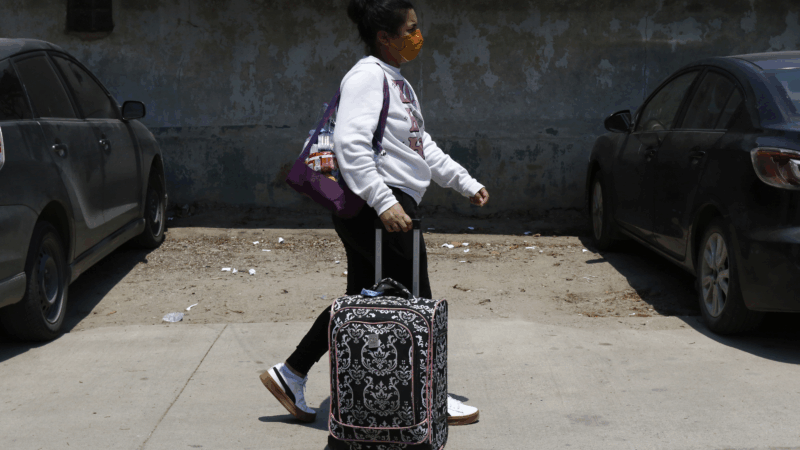U.S. sends 68 migrants back to Honduras and Colombia in first voluntary deportation
SAN PEDRO SULA, Honduras — The United States on Monday sent 68 immigrants from Honduras and Colombia back to their countries, the first government-funded flight of what the Trump administration is calling voluntary deportations.
In the northern Honduran city of San Pedro Sula, 38 Hondurans, including 19 children, disembarked from the charter flight carrying $1,000 debit cards from the U.S. government and the offer to one day be allowed to apply for legal entry into the U.S.
U.S. President Donald Trump has promised to increase deportations substantially. Experts believe the self-deportation offer will only appeal to a small portion of migrants already considering return, but unlikely to spur high demand. The offer has been paired with highly-publicized migrant detentions in the U.S. and flying a couple hundred Venezuelan migrants to a maximum-security prison in El Salvador.
Kevin Antonio Posadas, from Tegucigalpa, had lived in Houston for three years, but had already been considering a return to Honduras when the Trump administration announced its offer.
“I wanted to see my family and my mom,” said Posadas, who added that the process was easy.
“You just apply (through the CBP Home app ) and in three days you’ve got it,” he said. The flight left Houston early Monday. “It’s good because you save the cost of the flight if you have the intention of leaving.”
Posadas said he hadn’t feared deportation and liked living in the U.S., but had been thinking for some time about going home. He said eventually he would consider taking up the U.S. government’s offer of allowing those who self-deport to apply to enter the United States legally.
In a statement about the flight Monday, U.S. Homeland Security Secretary Kristi Noem said, “If you are here illegally, use the CBP Home App to take control of your departure and receive financial support to return home. If you don’t, you will be subjected to fines, arrest, deportation and will never be allowed to return.”
Twenty-six more migrants aboard the flight were headed home to Colombia, according to a U.S. Department of Homeland Security statement.
Honduras Deputy Foreign Minister Antonio García said the Honduran government would also support the returning migrants with $100 cash and another $200 credit at a government-run store that sells basic necessities.
Among the migrants arriving voluntarily Monday were four children who were born in the United States, García said.
García, who met the arriving migrants at the airport, said they told him that being in the U.S. without documents required for legal immigration or residence had been increasingly difficult, that things were growing more hostile and they feared going to work.
Still, the number of Hondurans deported from the U.S. so far this year is below last year’s pace, said Honduras immigration director Wilson Paz.
While about 13,500 Hondurans have been deported from the U.S. this year, the figure stood at more than 15,000 by this time in 2024, Paz said.
He didn’t expect the number to accelerate much, despite the Trump administration’s intentions.
Some would continue applying to self-deport, because they feel like their time in the U.S. is up or because it’s getting harder to work, he said.
“I don’t think it will be thousands of people who apply for the program,” Paz said. “Our responsibility is that they come in an orderly fashion and we support them.”
House Dem. Leader Jeffries responds to air strikes on Iran by U.S. and Israel
NPR's Emily Kwong speaks to House Minority Leader Hakeem Jeffries (D-NY), who is still calling for a vote on a war powers resolution following a wave of U.S.- and Israel-led airstrikes on Iran.
Iran’s Ayatollah Ali Khamenei is killed in Israeli strike, ending 36-year iron rule
Khamenei, the Islamic Republic's second supreme leader, has been killed. He had held power since 1989, guiding Iran through difficult times — and overseeing the violent suppression of dissent.
Found: The 19th century silent film that first captured a robot attack
A newly rediscovered 1897 short by famed French filmmaker Georges Méliès is being hailed as the first-ever depiction of a robot in cinema.
‘One year of failure.’ The Lancet slams RFK Jr.’s first year as health chief
In a scathing review, the top US medical journal's editorial board warned that the "destruction that Kennedy has wrought in 1 in office might take generations to repair."
Here’s how world leaders are reacting to the US-Israel strikes on Iran
Several leaders voiced support for the operation – but most, including those who stopped short of condemning it, called for restraint moving forward.
How could the U.S. strikes in Iran affect the world’s oil supply?
Despite sanctions, Iran is one of the world's major oil producers, with much of its crude exported to China.




